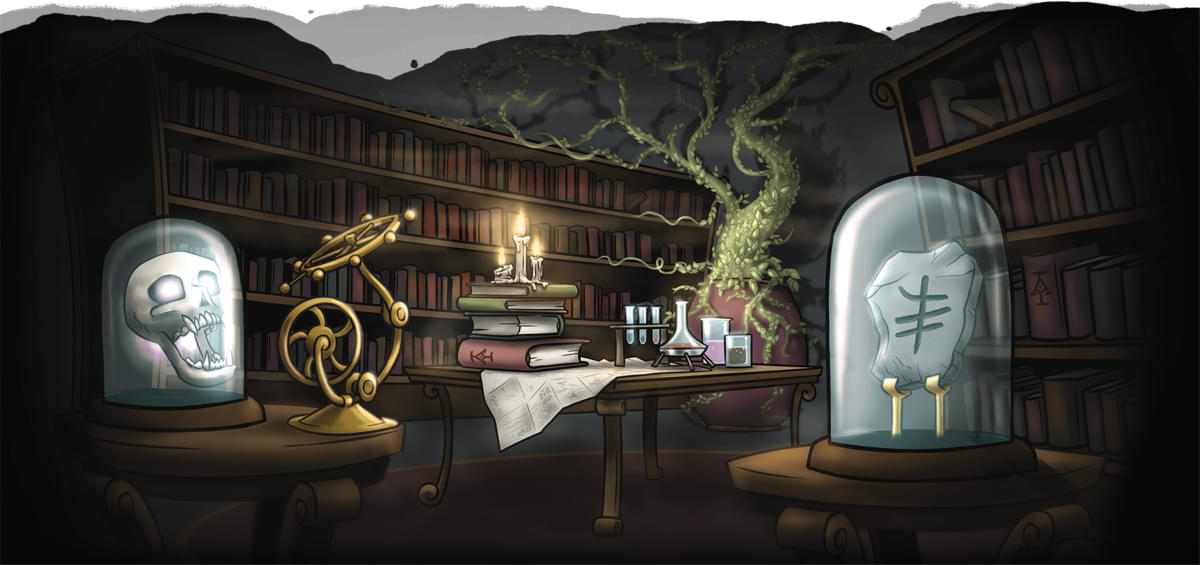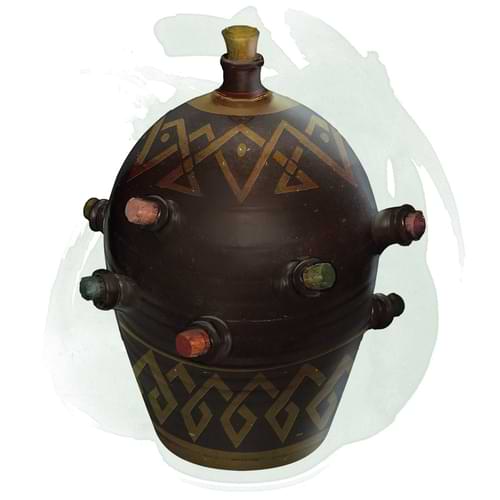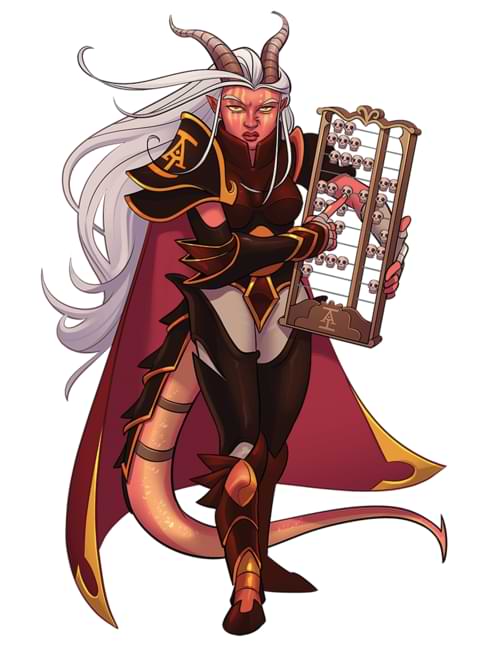A cap of water breathing, a ring of mind shielding, a driftglobe. Plenty of magic items found in Dungeons & Dragons books are only situationally useful, and rightfully so. But gold-strapped players might overlook such items during the perennial shopping session, opting for magic items their characters are sure to use in the adventures ahead.
If you want to encourage your players to explore new kinds of magic items or even drop hints of challenges to come, you can offer magic item rentals. Here's how.
What if my campaign is in a low-magic setting?
If you don't permit magic items in your campaign or the adventure takes place in a low-magic setting, magic item rentals can feel out of place or go against the mythos you've established. In these cases, consider renting out unique equipment or even vehicles. Characters embarking on a cross-country adventure could be thrilled to learn that they can rent out a lavish carriage outfitted with a workspace and plush bedding. You could also offer clothing rentals that help the characters better express themselves or influence certain non-player characters (NPCs), such as at a local lord's event.
How to implement magic item rentals
Allowing the characters to rent out magic items takes some upfront work on your part as the Dungeon Master. Follow these steps to get started.
1. Decide who is offering the service

As you construct your magic item rental system, consider any previous shopkeeps, organizations, or powerful NPCs the party has had a positive experience with that could benefit from renting out magic items. Perhaps a shop owner has begun renting out his less-popular merchandise or a retired adventurer rents out his old gear to fund their lavish lifestyle. The characters are powerful adventurers whose fame will only grow over time, so anyone seeking to establish themselves in the magic item business would do well to work out a deal with the party.
However, you might not need to look any further than the characters' own employer. In a previous adventure I ran, the characters were part of the Realm Guard, a homebrew faction. They were responsible for investigating mysterious portals to the Shadowfell that were appearing along the Sword Coast. The characters were sent on all manner of quests in different locations. They spent whole sessions in Baldur's Gate and ventured into the Forest of Wyrms, for example. Although the faction supported the party, it did not have the funds to simply gift magic items to the characters. Instead, it allowed them to rent out magic items from a small collection. This allowed the Realm Guard to raise funds for their operations.
2. Determine which magic items can be rented
 The Realm Guard's rental system was simple. At its base in Baldur's Gate, the characters could peruse a curated selection of around a dozen magic items. After each quest, the list of magic items would update, reflecting the fact that other faction members were renting out and returning magic items. I specifically chose magic items that I hadn't seen my players' characters use in previous campaigns, that encouraged roleplay, or that I just wanted to see in action. In one case, I included a saddle of the cavalier, a wink to the fact that the characters would soon obtain mounts.
The Realm Guard's rental system was simple. At its base in Baldur's Gate, the characters could peruse a curated selection of around a dozen magic items. After each quest, the list of magic items would update, reflecting the fact that other faction members were renting out and returning magic items. I specifically chose magic items that I hadn't seen my players' characters use in previous campaigns, that encouraged roleplay, or that I just wanted to see in action. In one case, I included a saddle of the cavalier, a wink to the fact that the characters would soon obtain mounts.
I only included magic items that wouldn't make my life harder as the DM. (Sorry, helm of teleportation.) That means I only included common and uncommon magic items. Because I'm already generous with loot, I abstained from popular options as well, like cloaks of protection and winged boots. I offer such magic items during major story beats and challenging combat encounters. For high-level parties, however, you might include some rare magic items.
To help you brainstorm magic items to rent out, here's a list of the rentals I offered my group of low-level adventurers:
Offering a rent-to-own program
If your players' characters are hoping to one day own a staff of fire or similarly expensive magic item, you could implement a rent-to-own program. With this type of program, the characters' rental payments are counted toward the magic item's purchase price. So, if that dragon scale mail costs a whopping 10,000 gold, a character could take it on their adventures and eventually come to own it. This allows the players to enjoy rarer and more powerful magic items long before their characters could normally afford them. Just make sure that permitting the characters to acquire such magic items doesn't make balancing encounters impossible for you.
3. Set the cost for the magic items
 The Dungeon Master's Guide assigns general gold values for magic items based on their rarity. To make your job of determining rental prices easy, you could make the rental cost of a magic item equal to 10% of its average value. For example, a rare magic item is typically valued at 501 to 5,000 gold, so it would cost about 275 gold per rental period. You could then adjust this amount according to the following factors:
The Dungeon Master's Guide assigns general gold values for magic items based on their rarity. To make your job of determining rental prices easy, you could make the rental cost of a magic item equal to 10% of its average value. For example, a rare magic item is typically valued at 501 to 5,000 gold, so it would cost about 275 gold per rental period. You could then adjust this amount according to the following factors:
- How long the character will have the magic item
- How powerful you perceive the magic item to be
- The demand for such a magic item
Because my party didn't have a lot of gold and I stuck to common and uncommon magic items that were only situationally powerful, I charged the characters 5 to 25 gold per rental. Keep in mind that I'm generous with magic items and the characters only had the magic items for about three sessions at a time. You might have to toy with pricing and the selection of magic items before you hit that sweet spot — where the characters are willing to spend their hard-earned gold to rent magic items but planning encounters isn't any more difficult for you than usual.
If you're concerned about the party stocking up on tons of magic items at once, set a hard limit on how many magic items they can rent. A vendor might be excited to see that their stock of magic items has driven a lot of interest but still refuse to rent out more than one magic item per character in order to limit their risk. Adventurers do have a nasty habit of dying, after all.
4. Establish how and when magic items should be returned
In my adventure, the characters quested in and around Baldur's Gate. They had free lodging at the Realm Guard's base, so it was fitting that they were asked to return any rented magic items after each debriefing. However, you might need to get clever if your adventurers will be traveling far on their quests or be gone for long periods of time.
Consider these ways that a rented magic item could be returned:
- A courier service employs quicklings and specializes in the delivery of magic items. The delivery fee is included in the rental price.
- The magic item is teleported back to its owner on the seventh dawn after it was rented.
- The magic item can be returned at any number of (well-guarded) dropoff locations.
- The character is provided a magical chest that can be used to return the magic item.
5. Include penalties for late returns and thievery
 To ensure the characters promptly return magic items, establish a penalty for late returns. For each day a rental is late, the character is charged a fee equal to 1% of the magic item's rental cost, for example. You could also stipulate that a rented magic item is considered stolen 14 days after its due date. This would ensure the characters make it a priority to return their magic items, or at least lead to a hilarious roleplay moment where they suddenly find themselves getting arrested for thievery.
To ensure the characters promptly return magic items, establish a penalty for late returns. For each day a rental is late, the character is charged a fee equal to 1% of the magic item's rental cost, for example. You could also stipulate that a rented magic item is considered stolen 14 days after its due date. This would ensure the characters make it a priority to return their magic items, or at least lead to a hilarious roleplay moment where they suddenly find themselves getting arrested for thievery.
If the characters do have sticky fingers, have a failsafe so that they don't run off with hundreds or thousands of gold worth of magic items. For example, if a magic item is not returned on time, it could lose its magic until returned or impart a curse on whoever has it. If you wish to prevent the characters from selling stolen goods, each magic item could bear a script that designates it as a rental.
Play with new magic items
A magic item rental system is a low-risk way for you and the party to experience a wide variety of magic items. If you rent out a magic item but find that it creates an imbalance, you can rest assured that the character will only have the magic item for a short while. On the flip side, you might find that your players enjoy testing out magic items that they'd otherwise look over. One of my players rented a ring of jumping on a whim and had so much fun that he asked to purchase it from the faction. I was ecstatic to hear him say that he'd been sleeping on the magic item.
I think that's the real strength of this type of system: it encourages the players to experiment and it won't empty their characters' pockets. I hope you try it out and love it!
Michael Galvis (@michaelgalvis) is a tabletop content producer for D&D Beyond. He is a longtime Dungeon Master who enjoys horror films and all things fantasy and sci-fi. When he isn’t in the DM’s seat or rolling dice as his anxious halfling sorcerer, he’s playing League of Legends and Magic: The Gathering with his husband. They live together in Los Angeles with their adorable dog, Quentin.








-
View User Profile
-
Send Message
Posted Nov 16, 2021I like this idea. I could see doing it with charged items. There could be a recharge stipulation that the item has some charm on it that prevents it from recharging unless returned to the shop for service, the temple for the priests to pray upon, etc. This would help for maintaining the rent to own plan - upon full ownership the charm is removed. It also would serve as an added control on party resources.
-
View User Profile
-
Send Message
Posted Nov 16, 2021nice job with this article.
-
View User Profile
-
Send Message
Posted Nov 16, 2021I love this, going to implement it into my Icewind Dale campaign
-
View User Profile
-
Send Message
Posted Nov 16, 2021This idea seems great. I have players near Candlekeep, which will work for keeping them coming back and paying. I will probably use the quicklings if far away.
I do think debt and rent to own schemes could be an interesting addition. Having a low level character, enamoured by a magic item, end up in debt could be interesting. Making them more likely to take a risk to get the mission done and push a bit harder. Could also have them do quests for the renter! Maybe retrieving rented items from the previous renters, maybe they're on the run, maybe they're in a dungeon, or maybe they've gone missing and you need to track them down!
-
View User Profile
-
Send Message
Posted Nov 16, 2021I love this idea! Especially considering that in most settings, magic items are so valuable that they're almost never sold outright. Or is that just most of mine? Well anyway, I'm totally using this! I'd definitely use the quickling return and delivery system. Every week or so, the quickling will just appear out of nowhere and ask for your recurring payment or the magic item. If the characters give neither, the quickling just points at them, screams some phrase in sylvan, and the magic item is cursed.
Unlike most quicklings, these are fairly polite and codial.
-
View User Profile
-
Send Message
Posted Nov 16, 2021What would happen if players die? How would the items get back to the owner?
-
View User Profile
-
Send Message
Posted Nov 16, 2021All I can think about is the players turning into repo men than accidently renting over the time they had set only to have others try and repo them
-
View User Profile
-
Send Message
Posted Nov 16, 2021You could have the rental agreement stipulate that if the character dies, a predesignated party member becomes responsible for the magic item's return. Something similar to cosigner.
-
View User Profile
-
Send Message
Posted Nov 16, 2021Love the concept
-
View User Profile
-
Send Message
Posted Nov 16, 2021Really like this idea; a little veneer of bureaucracy always adds a bit more depth to a world, and it’s a good way of giving the players a taste of extra power
-
View User Profile
-
Send Message
Posted Nov 16, 2021I love the system, but damn it feels too real. Kinda reminded me of the car payments, mortgage, and student loans I have IRL.
-
View User Profile
-
Send Message
Posted Nov 16, 2021How do you make an attack on the online character sheets
-
View User Profile
-
Send Message
Posted Nov 16, 2021I feel like this would be a good way to incorporate fae and devils. Possibly a warlock patron who sends the warlock to collect magic items and allows the party to use them until they are able to bring it back to the patron.
-
View User Profile
-
Send Message
Posted Nov 16, 2021This could be a great way to throw your players a bone if they have an item wishlist. But, let's face it: most rentals are varying degrees of used. That means a DM could allow a player to rent the super-powerful, game breaking item they've always wanted, but since it's used, it comes with flaws, such as a chance of misfiring or simply not working.
-
View User Profile
-
Send Message
Posted Nov 16, 2021That is actually a really good idea.
-
View User Profile
-
Send Message
Posted Nov 16, 2021Love this concept! Plus, an innocent magical goods rental service can always be a guise for something a little more sinister.
-
View User Profile
-
Send Message
Posted Nov 16, 2021Artificer infusions make rental returns pretty easy. Just move the infusion to a new item. Include the non-magical equipment price in the rental cost or infuse the customer's item.
-
View User Profile
-
Send Message
Posted Nov 17, 2021Wow I love this! I'm definitely adding that to my future Ravnica campaign
-
View User Profile
-
Send Message
Posted Nov 17, 2021I've had magic item renting shops in my world for a while since I also found it a really cool way to let the players be able to spend their gold as they are buying supplies in the city before setting out to kill a huge unknown beast that been attacking and killing the local Shephard's sheep, to also pay for a temporary increase to their combat power. It gives the players the option to discuss and decide if they believe a magic item or more would be wise for the job, depending on how many they can afford.
My version of a magic item renting service is specialized shops owned by Artificers. Instead of renting out magic items (and to avoid having to keep track of who has what and for how long, and them needing to return it, especially if they rent multiple) my shops offers to Infuse an item that the person renting already owns.
The choices are limited to amount of artificers that are working in the individual shops. Few workers (minimum of 2) in small cities, and multiple in large cities, which makes it easier to get a specific infusion or a higher level one easier in the large Infusion shops.
When entering the shop I roll a d4 for how many infusions that is currently being rented reducing the number of infusions the party can get (The shop clerk can offer the party to reserve the infusions they want up to how many the specific shop can create, paying for them now, and then come back the next day to get their items infused.
Rented Infusions are generally active until the next dawn, but can be extended until the following dawn for a price. when the duration is up the infused item loses its magical enchantment.
-
View User Profile
-
Send Message
Posted Nov 17, 2021Wow, this is a fantastic idea that doesn't rely on some "self-returning" magic items or a network of quicklings (or other types of creatures) that act as rent "enforcers". How do you work out the cost per day of the infusions that you make available to the party?